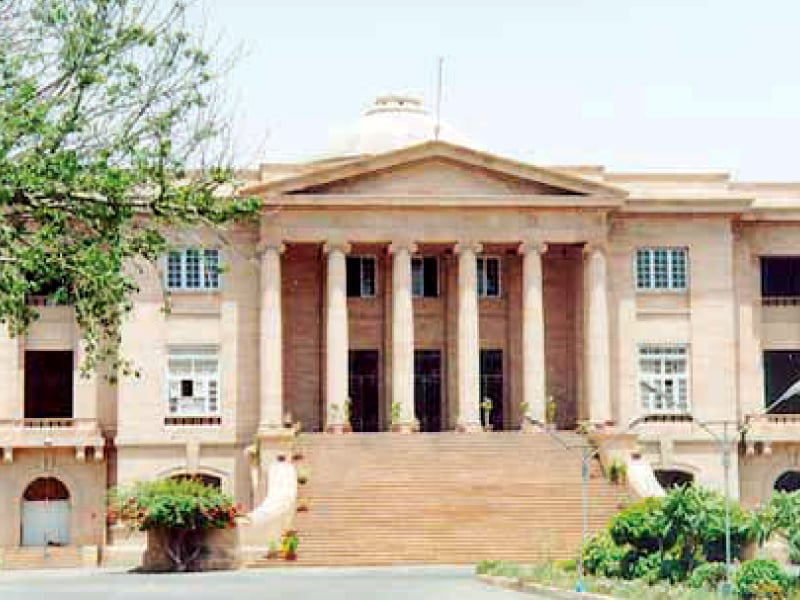
The Sindh High Court disposed of a petition challenging the rules and procedures of local body elections in Sindh on Monday. A two-member bench headed by Justice Muhammad Ali Mazhar heard the Pakistan Muslim League-Nawaz’s petition challenging the notification for local body elections 2015 and its rules.
Local body representatives have completed their terms, remarked Justice Mazhar. How can the notification be annulled now, he asked, adding that the petition had been ongoing for some time and more of the court’s time should not be wasted.
The notification of election and rules is being challenged, said the petitioner’s lawyer, advocate Mureed Ali Shah. He argued that the local government election schedule was released first and then the rules were notified in 2015.
The Election Commission of Pakistan’s (ECP) counsel, Abdullah Hinjra, told the court that the rules were made before the election schedule was released. New elections will be held according to the rules upheld in 2015, he said.
The court disposed of the petition, telling the petitioner’s lawyer that a new petition can be filed in case any issues arise this time. The court remarked it could not declare the past election null and void.
Island dispute
Meanwhile, the high court issued a written order for the last hearing over the island dispute on Friday, when the court directed the counsels of Sindh, Centre and the petitioners to prepare arguments on the legality of the contentious Pakistan Island Development Authority (PIDA) Ordinance and handing over management of provincial islands to the federation.
According to the court’s written order, two more petitions have been filed regarding the islands. The court issued notices to the Attorney General of Pakistan (AGP) and the Sindh advocate-general on the new petitions and directed the petitioners to provide copies of their petitions to the same. The next hearing is scheduled for November 13.
The writ order mentions that the AGP has given preliminary arguments that the Supreme Court has the power to hear disputes between the federation and provinces under Article 184 of the Constitution of Pakistan, and that the federal government is consulting the Sindh government regarding the recently promulgated ordinance.
No development work will be initiated without consultation and the environment, especially mangroves, will be protected, said the AGP, maintaining that the ordinance, intended for development work, was not final and could be amended if needed after consultation with the Sindh government.
The court recorded the AGP’s statement.
The provincial lawyer had contradicted the claim of negotiations and had informed the court of the Sindh Assembly’s resolution calling for the ordinance’s revocation.
The petitioners had contended that the Centre has already begun issuing tenders for construction work.
Banning Indian FM stations
Separately, the two-member bench led by Justice Muhammad Ali Mazhar issued notices to the federal and provincial governments, interior ministry, information and broadcasting ministry and others over a petition seeking the ban of Indian FM radio stations in Tharparkar.
Petitioner Mureed Ali Shah contended that Indian radio stations 102 and 103 were broadcasting propaganda against Pakistan and its armed forces. He prayed the court to issue orders to stop the broadcast.
Justice Mazhar asked how the Pakistan Electronic Media Regulatory Authority (PEMRA) could take action. The matter can be looked into by the home and information ministries, he said, issuing notices to relevant authorities.
Disqualification sought
The bench also issued notices to the ECP over a fresh petition seeking the disqualification of PTI leader Haleem Adil Shaikh and adjourned the hearing indefinitely.
The ECP’s law officer stated that the body had already submitted its reply in a previous similar petition against Sheikh.
Petitioner Abdul Rahim’s lawyer contended that Shaikh, who is also a MPA, had not disclosed his source of income before the ECP. His statements do not mention the expenses of his two daughters, which are being paid for by an American bank, maintained the petitioner’s lawyer, providing details of a bank account based in New Jersey.
The lawyer argued that Sheikh did not disclose a Nawabshah poultry complex either and should be denotified for concealing sources of income and assets. The petitioner’s counsel prayed the court to disqualify Shaikh.
The court issued notices to the ECP over the new petition, sought replies from the respondents including Shaikh, and sought arguments on the maintainability of the petition before adjourning the hearing indefinitely.
Published in The Express Tribune, October 27th, 2020.


















COMMENTS
Comments are moderated and generally will be posted if they are on-topic and not abusive.
For more information, please see our Comments FAQ